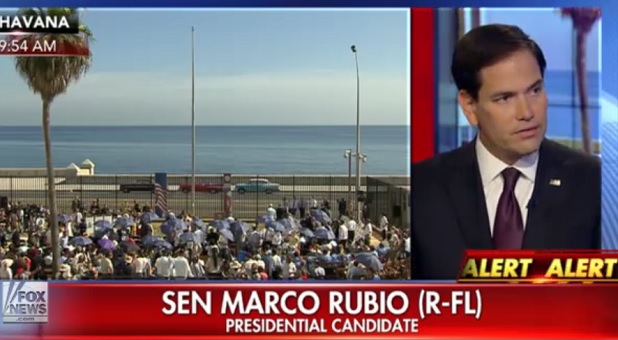Rubio: ‘It’s Almost Like the U.S. Has Surrendered’ on Cuba
It was an historic moment: For the first time in five decades, the U.S. Embassy in Havana, Cuba, was officially open for business. But that’s not necessarily a good thing for the people of Cuba, or the United States, Sen. Marco Rubio said. Rubio, whose family came from the island in the late 1950s, said the move is a U.S. concession that won nothing in return. “It’s almost like the U.S. has surrendered,” he said on Fox News as the U.S. flag was about to be raised over the Embassy. For decades, a bipartisan consensus agreed that the island would be isolated until it lived up to the accepted norms of political society: it would recognize the basic human rights of its people. But this deal did nothing for the Cuban people. So, what reforms led up to this moment? According to Freedom House:
In 2014, the Cuban government increased its systematic use of short-term “preventive” detentions—along with harassment, beatings, and “acts of repudiation”—to intimidate the political opposition, isolate dissidents from the rest of the population, and maintain political control of all public spaces. A record number of politically motivated detentions were recorded in 2014, and crackdowns on activists continued… Churches may not conduct ordinary educational activities, and many church-based publications are plagued by state as well as self-censorship. Progress was evident in 2014, however, when the government granted the Catholic Church permission to build a new religious center for the first time in more than 50 years.
“This is a unilateral change,” Rubio said. The policy was “totally one-sided. It almost feels like we are accepting that the Cuban people forever will have to live under an oppressive government.” But isn’t dialogue the panacea for all the world’s woes? If only we talk things over, troubles will pacify and eventually the other side will come to see your point of view, right? There was no evidence of that. Instead, Cuba used a joint press conference with Secretary of State John Kerry as an opportunity to claim that the United States is a worse human rights abuser than Fidel Castro – making a none-too-veiled reference to Ferguson and Baltimore. Cuban Foreign Minister Bruno Rodriguez said, “Cuba is not a place where there are acts of racial discrimination or police brutality that result in deaths; nor is it under Cuban jurisdiction the territory where people are tortured or held in a legal limbo.” He demanded that the United States close, not just the detention center, but the entire U.S. naval base at Guantanamo Bay. Fidel Castro, now 89, also demanded that the United States pay the island “many millions of dollars” in reparations for the trade embargo it has maintained against his dictatorship. The only other prominent world leader who demands the closure of Guantanamo Bay and offers (and pays) millions of dollars in reparations is Barack Obama. What do you think? Is opening up formal diplomatic relations with Castro’s Cuba good or bad?













